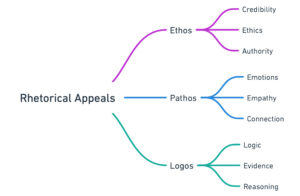Aristotle considered ethos in communication the most powerful rhetorical proof—the speaker’s character manifested through the speech (Rhetoric 1356a5-15).
Ethos is critical in persuasive communication because it establishes the speaker’s or writer’s character and trustworthiness. Aristotle recognized that an audience’s perception of the communicator’s character greatly influences their willingness to accept and be persuaded by the message.
When the audience perceives the communicator as embodying shared values and beliefs, they are likelier to establish a connection and be influenced by the message. Ethos thus facilitates a deeper level of engagement and resonance, strengthening the bond between the communicator and the audience.
Lisa J. Nelson, Becoming Kairotic: The Art of Communicating in a Changing World
Knowledge, honesty, and reliability
Credibility and trust are fundamental components of ethos, contributing significantly to communication effectiveness. Ethos establishes the speaker’s credibility and trustworthiness with the audience, fostering an environment in which the audience is more inclined to believe and accept the message. Perceived knowledge, honesty, and reliability are pivotal in shaping the audience’s perception of the communicator, influencing their receptiveness to the message.
Furthermore, establishing ethos grants the communicator authority on the subject matter, imbuing their arguments and opinions with more significant influence and weight. By positioning the communicator as an authoritative figure, ethos enhances the message’s persuasiveness, making the audience more receptive to the communicator’s ideas and assertions.
Ethos also serves as a mechanism for overcoming audience resistance to the message. When the audience may harbor skepticism or initial resistance, a strong ethos can help assuage doubts and create a more open and receptive environment for persuasion. The credibility and trust established through ethos mitigate barriers to acceptance, facilitating greater engagement and acceptance of the message.
Reinforce the speaker’s credibility
In addition, ethos complements and enhances the overall persuasive impact of communication by reinforcing the speaker’s credibility. In conjunction with pathos (emotional appeal) and logos (logical appeal), ethos forms a solid foundation for the message, amplifying its persuasive efficacy. The credibility established through ethos lends credibility and authority to the emotional and logical appeals, bolstering the compelling impact.

Ethos connects the communicator and the audience, aligning their values and beliefs. When the audience perceives the communicator as embodying shared values and beliefs, they are likelier to establish a connection and be influenced by the message. Ethos thus facilitates a deeper level of engagement and resonance, strengthening the bond between the communicator and the audience.
Strengthen your communication credibility
Gaining credibility, or ethos, is essential for effective communication and persuasion. Building ethos involves establishing yourself as a trustworthy and knowledgeable communicator in the eyes of your audience. Here are some strategies to enhance your credibility:
- Expertise: Demonstrate your knowledge and expertise in the subject matter you are addressing. Showcase your qualifications, education, and experience to establish yourself as a credible authority.
- Research and preparation: Thoroughly research your topic and be well-prepared before communicating with your audience. Having a deep understanding of the subject will make you more credible.
- Honesty and integrity: Be honest and transparent in your communication. Avoid exaggerations or making false claims. Admitting when you don’t know something can also enhance your credibility.
- Use of evidence: Support your claims with reliable and relevant evidence, data, and examples. Presenting facts and evidence strengthens your credibility and persuasiveness.
- Consistency: Be consistent in your messages and actions. Inconsistencies can erode your credibility.
- Relatability: Establish a connection with your audience by being relatable and showing empathy. Understanding their needs and concerns can build trust.
- Language and tone: Use clear and respectful language. Avoid jargon or overly complex terms that might alienate your audience. Maintain a professional and respectful tone.
- Ethical behavior: Act ethically and with integrity in all aspects of your life. People are more likely to trust and respect those who exhibit ethical behavior.
- Cite trusted sources: When referencing other experts or sources, cite reputable and well-respected individuals or organizations. This reinforces your credibility.
- Audience awareness: Understand your audience’s values, beliefs, and preferences. Tailor your communication to meet their needs and interests.
- Long-term commitment: Building ethos takes time and consistent effort. Maintain your credibility by consistently demonstrating expertise and ethical behavior.
- Accept feedback: Be open to feedback and constructive criticism. Showing a willingness to learn and improve can enhance your credibility.
Remember that credibility is earned over time and can be fragile. Your communication must be authentic, reliable, and ethical to build lasting trust with your audience.
DO YOU NEED HELP WITH YOUR COMMUNICATION?
